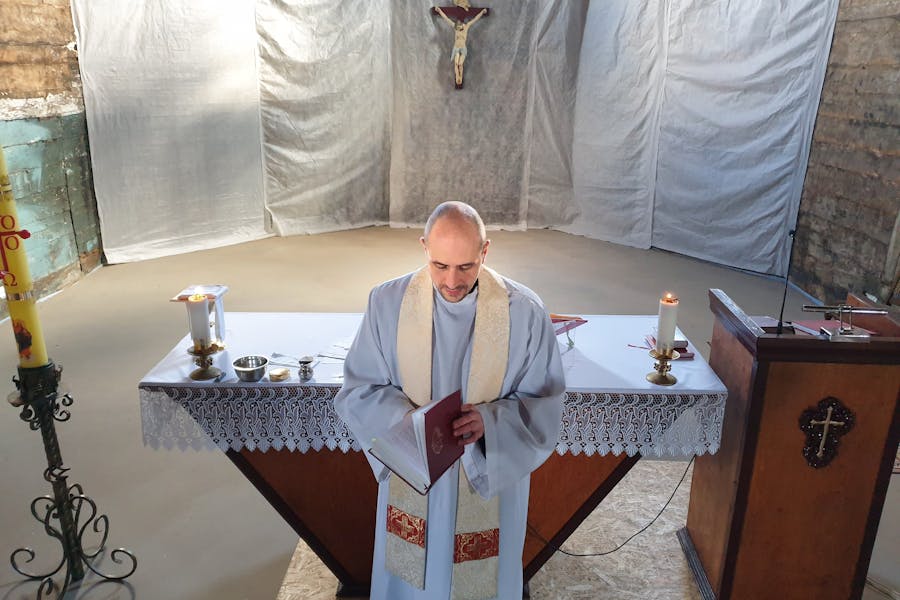The question “Is Pope Francis the last pope?” has sparked considerable debate and intrigue among scholars, theologians, and the general public. Rooted in prophecies, historical interpretations, and current global events, this inquiry delves into the realm of speculation and religious foresight.
Pope Francis, elected in 2013, has brought significant changes to the Catholic Church, focusing on issues like social justice, climate change, and interfaith dialogue. Yet, amidst these transformative efforts, a subset of believers and theorists ponder whether his papacy might be the final chapter in the long history of the Catholic Church. This article aims to explore the origins of this question, examine the various perspectives surrounding it, and analyze the potential implications for the future of the papacy and the Catholic faith.
Is Pope Francis the last pope?
While some believe his progressive stance and the current global challenges suggest the end of the papacy, there is no concrete evidence supporting this claim. Historically, the Catholic Church has withstood numerous crises, indicating the continuation of the papacy beyond Pope Francis.
Historical Context And Prophecies
The idea that Pope Francis might be the last pope is not new. Historical records and prophecies have often hinted at the end of the papacy during tumultuous times. One notable prophecy comes from Saint Malachy, a 12th-century Irish bishop who allegedly predicted the identities of 112 popes. According to his prophecies, Pope Francis is the 112th and final pope, leading many to speculate about the end times.
However, the credibility of Saint Malachy’s prophecies is widely debated. Many historians and theologians argue that these prophecies were fabricated centuries after his death. Moreover, the Catholic Church does not officially recognize these predictions. Instead, it views the continuity of the papacy as essential to its mission.
Throughout history, the Catholic Church has faced numerous crises, from the Great Schism to the Reformation. Each time, the institution emerged resilient, adapting to changing circumstances while maintaining its core beliefs. This historical resilience suggests that the papacy will continue beyond Pope Francis.
Additionally, other prophecies and predictions, such as those from Nostradamus and the Third Secret of Fatima, have been interpreted in various ways. While some interpretations align with the notion of the last pope, others foresee a period of renewal and reformation within the Church.
Pope Francis’s unique approach and progressive views have indeed marked a transformative period for the Catholic Church. His emphasis on social justice, environmental issues, and interfaith dialogue has sparked both admiration and controversy. These actions reflect a broader trend within the Church towards modernization and adaptation, which further supports the idea that the papacy will persist and evolve.
Ultimately, the idea of Pope Francis being the last pope is rooted in a mix of historical context, prophecy, and speculation. While it’s a fascinating topic, there is no definitive evidence to support this claim.
Theological Perspectives
The Role of the Papacy in Catholic Doctrine
The papacy is a fundamental aspect of Catholic doctrine. According to Catholic belief, the pope is the spiritual successor to Saint Peter, whom Jesus appointed as the leader of his apostles. This apostolic succession ensures that the teachings and authority of the Church remain intact. The pope’s role includes guiding the Church in matters of faith and morals, ensuring unity among Catholics worldwide, and serving as a symbol of the Church’s continuity and stability.
Interpretations of Biblical Texts
Some interpretations of biblical texts suggest the end of the papacy as a sign of the end times. For instance, the Book of Revelation is often cited in discussions about the last pope. However, these interpretations vary widely, and the Catholic Church does not endorse a literal reading of these apocalyptic predictions. Instead, the Church emphasizes the importance of hope and renewal, viewing the papacy as an enduring institution that will continue to guide the faithful through changing times.
Modern Theological Debates
Modern theological debates also play a role in this discussion. Pope Francis’s progressive views on issues such as climate change, social justice, and interfaith dialogue have sparked both admiration and controversy. Some traditionalists view these changes as a departure from established doctrine, while others see them as necessary adaptations. These debates reflect the dynamic nature of the Church and its ability to engage with contemporary issues while remaining rooted in its foundational beliefs.
The Future of the Papacy
The future of the papacy depends on the Church’s ability to navigate contemporary challenges. Issues such as declining church attendance, scandals, and secularization pose significant threats. Yet, the Church has historically adapted to change, suggesting that the papacy will continue to evolve. Pope Francis’s efforts to address modern issues and reform the Church highlight the potential for renewal and growth, ensuring that the papacy remains a vital and influential institution.
Impact of Pope Francis’s Reforms
Pope Francis has introduced numerous reforms aimed at modernizing the Church and addressing pressing global issues. His focus on poverty, climate change, and social justice has resonated with many, positioning the Church as a proactive force in addressing contemporary challenges. These reforms demonstrate the potential for the papacy to adapt and thrive in the modern world, further supporting the idea that Pope Francis will not be the last pope.
Speculative Perspectives and Popular Culture
Pope Francis’s papacy has inspired numerous speculative perspectives and popular culture references. The notion of the last pope has been explored in books, movies, and television series, capturing the imagination of many.
- Popular culture often dramatizes the idea of the last pope.
- Books like “The Last Pope” by Luis Miguel Rocha delve into this topic.
- TV series such as “The Young Pope” explore modern papal themes.
- Speculative theories often blend fact and fiction, influencing public perception.
- These cultural references highlight the enduring fascination with the papacy.
In addition to these cultural references, various conspiracy theories have emerged, suggesting that Pope Francis’s papacy is a prelude to significant global changes or even the apocalypse. These theories, while lacking credible evidence, contribute to the ongoing intrigue and speculation surrounding the future of the papacy.
The portrayal of the last pope in popular culture often reflects broader societal anxieties and hopes. By engaging with these speculative perspectives, audiences can explore complex themes related to faith, leadership, and the future of religion in an ever-changing world. Ultimately, while entertaining, these portrayals are not rooted in factual evidence and should be viewed as part of a broader cultural narrative rather than definitive predictions.
Alternative View: Continuity and Renewal
While some speculate about the end of the papacy, others believe in its continuity and renewal. This perspective focuses on the Church’s ability to adapt and reform.
Pope Francis himself has emphasized the need for renewal within the Church. His efforts to address issues such as corruption, sexual abuse, and environmental concerns reflect a commitment to modernizing the institution. This approach aligns with the idea that the papacy will continue to evolve.
Moreover, the Catholic Church’s structure supports the continuity of the papacy. The College of Cardinals, responsible for electing the pope, ensures that a new leader is chosen when the papal seat becomes vacant. This system has functioned for centuries, providing stability and succession.
Additionally, the Church’s ability to engage with contemporary issues demonstrates its potential for renewal. Pope Francis’s focus on social justice, climate change, and interfaith dialogue reflects a broader trend towards modernization. These efforts highlight the Church’s commitment to remaining relevant and influential in the modern world.
Ultimately, the perspective of continuity and renewal suggests that the papacy will persist. Pope Francis’s tenure may be a transformative period, but it is unlikely to be the end of the papacy. Instead, his leadership may pave the way for future popes to continue addressing global challenges and guiding the faithful.
Contemporary Challenges and the Papacy
Declining Church Attendance
One of the significant challenges facing the Catholic Church is the decline in church attendance. In many parts of the world, secularization has led to fewer people participating in religious activities, which poses a threat to the Church’s influence and reach. Pope Francis has acknowledged this issue and called for renewed efforts to engage with the faithful, particularly younger generations.
Scandals and Church Reform
The Catholic Church has faced numerous scandals, particularly concerning sexual abuse. Pope Francis has taken steps to address these issues, implementing reforms to prevent future abuses and restore trust. These efforts are crucial for the Church’s credibility. Establishing new guidelines and accountability measures demonstrates the Church’s commitment to addressing past wrongs and ensuring a safer environment for all.
Social and Political Issues
Pope Francis has been vocal about various social and political issues, from climate change to immigration. His stance on these topics reflects a broader understanding of the Church’s role in modern society. However, it also invites criticism from those who prefer a more traditional approach. The pope’s emphasis on social justice highlights the Church’s potential to be a force for positive change in addressing global challenges.
Technological Advancements
The digital age presents both opportunities and challenges for the Catholic Church. While technology enables greater outreach and communication, it also requires the Church to adapt its message and methods to engage a tech-savvy audience. The Vatican’s increasing use of social media and digital platforms illustrates the Church’s efforts to stay relevant and accessible in a rapidly changing world.
Interfaith Dialogue
Pope Francis has emphasized the importance of interfaith dialogue. Building relationships with other religious communities is essential for promoting peace and understanding. This approach can also help address misconceptions and foster cooperation. The pope’s engagement with leaders of different faiths underscores the potential for the Church to play a pivotal role in fostering global unity and collaboration.
What historical precedents support papal continuity?
- Historical Precedents of Papal Continuity: The Catholic Church has a long history of overcoming challenges and continuing the papal lineage. From the Great Schism to the Reformation, the Church has consistently found ways to adapt and maintain its leadership structure.
- Saint Malachy’s Prophecies: While intriguing, the prophecies of Saint Malachy, which predict Pope Francis as the last pope, are widely debated in terms of authenticity and interpretation. The Church does not officially recognize these prophecies, viewing them as speculative rather than doctrinal.
- Pope Francis’s Reforms: Pope Francis’s tenure has been marked by significant reforms aimed at addressing contemporary issues such as climate change, social justice, and interfaith dialogue. These reforms indicate an ongoing evolution of the papacy rather than an end.
- Theological Foundations: According to Catholic doctrine, the papacy is an enduring institution, rooted in the apostolic succession from Saint Peter. This theological foundation suggests that the papacy is intended to continue, guiding the faithful through successive generations.
- Cultural and Popular Speculations: Popular culture often explores the idea of the last pope, blending fact and fiction in books, movies, and TV series. While these portrayals captivate audiences, they are not based on factual evidence and should be seen as speculative narratives.
- Church’s Structural Resilience: The Catholic Church’s hierarchical structure, including the College of Cardinals, ensures that a new pope is elected upon the vacancy of the papal seat. This well-established system supports the continuity of the papacy.
- Future Challenges and Opportunities: The Catholic Church faces contemporary challenges such as declining attendance and scandals. However, these challenges also present opportunities for renewal and adaptation, suggesting that the papacy will continue to evolve in response to changing times.
Conclusion
As we explore the question, “Is Pope Francis the last pope?”, it becomes clear that while the notion is intriguing, it is rooted in speculation rather than fact. The Catholic Church has demonstrated remarkable resilience throughout history, adapting to numerous challenges while maintaining its core beliefs. Pope Francis’s progressive reforms reflect a commitment to renewal and modernization, suggesting that the papacy will continue to evolve. Ultimately, the future of the papacy lies in the Church’s ability to navigate contemporary issues and embrace opportunities for growth.
FAQs:
Has Pope Francis ever addressed the idea of being the last pope?
No, Pope Francis has not publicly addressed the idea of being the last pope. The topic remains speculative and based on various interpretations.
What are the principal prophecies suggesting Pope Francis could be the last pope?
The main prophecy suggesting Pope Francis could be the last pope comes from Saint Malachy, who predicted a list of 112 popes, with Pope Francis being the final one.
How does the Catholic Church view these prophecies?
The Catholic Church does not officially recognize prophecies like those of Saint Malachy. It views the continuity of the papacy as essential to its mission.
What challenges is the Catholic Church currently facing?
The Catholic Church faces challenges such as declining attendance, scandals, and the need to address contemporary social and political issues.










Leave a Reply